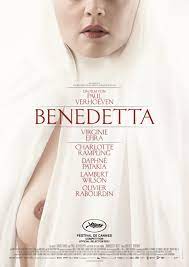![]() |
| ![]()
France | Belgium | Netherlands 2021
Opening December 2, 2021
Directed by: Paul Verhoeven
Writing credits: David Birke, Paul Verhoeven, Judith C. Brown
Principal actors: Virginie Efira, Charlotte Rampling, Daphné Patakia, Lambert Wilson, Olivier Rabourdin
 Dutch director-co-writer Paul Verhoeven craftily manipulated facts to spice up the mystic/lesbian Benedetta Carlini’s true story. The screenplay, co-written with David Birke, is based on Judith C. Brown’s novel, Immodest Acts: The Life of a Lesbian Nun in Renaissance Italy. In 1599 in Counter-Reformation Italy, it was acceptable for young girls to enter a Catholic convent. Sometimes for a better life, sometimes because of devotion, sometimes sent by overly zealot parents. In Benedetta Carlini’s (Elena Plonka) case, however, her unusual and unique religiousness prophesied to Giuliano (David Clavel) and Midea (Clotilde Courau) Carlini their daughter’s obvious calling. The abbess (Charlotte Rampling) and Giuliano barter her admittance.
Dutch director-co-writer Paul Verhoeven craftily manipulated facts to spice up the mystic/lesbian Benedetta Carlini’s true story. The screenplay, co-written with David Birke, is based on Judith C. Brown’s novel, Immodest Acts: The Life of a Lesbian Nun in Renaissance Italy. In 1599 in Counter-Reformation Italy, it was acceptable for young girls to enter a Catholic convent. Sometimes for a better life, sometimes because of devotion, sometimes sent by overly zealot parents. In Benedetta Carlini’s (Elena Plonka) case, however, her unusual and unique religiousness prophesied to Giuliano (David Clavel) and Midea (Clotilde Courau) Carlini their daughter’s obvious calling. The abbess (Charlotte Rampling) and Giuliano barter her admittance.
Fast-forward sixteen years: now Sister Elan, Benedetta (Virginie Efira) has ingratiated herself into the convent community and is a member of standing because of her visions. Then, the peasantry cloaked Bartolomea (Daphné Patakia) arrives seeking shelter against her rough father. Sister Elan helps her; although, Benedetta receiving the stigmata opens a path to being abbess. Meanwhile, Sister Elan’s maneuvers Bartolomea into closer quarters, outwits the priest (Olivier Rabourdin), and eventually faces off with papal nuncio, Alfonso Giglioli, (Lambert Wilson). As time will tell, though, Sister Christina (Louise Chevillotte) observes life around her with eyes wide open and sees it for what it is.
The film’s religious theatrics sidle along the fringe of the shocking (sex), passivity (religious), power struggles, and manipulation (among the gals and guys). Benedetta feels forced; the appalling misconstruing of facts is for shock value. The restrictive and controlling male dominated religious hierarchy was unprepared for Benedetta’s sexual relationship, which Verhoeven most likely got off on, since few cases were documented in the 17th century. Whatever, the acting is good, the production values sound, and the dialogue suffocative. Benedetta is the type of film people will like or loathe. 131 minutes ()
![]()
In the Tuscan city of Pescia, a young girl in the 17th century enters the local convent. Benedetta (Efira) believes deeply in the power of God, and soon the young novice begins experiencing fits of religious fervor and having visions of Jesus. When Benedetta receives the stigmata, the local priest suggests that it might be a miracle, but the abbess (Rampling) is skeptical. Bartolomea (Patakia), a local peasant girl, joins the convent to escape abuse at home, and seduces Benedetta. As the plague moves closer and closer, the women at the center of the story are subjected to scrutiny for their religious claims and sexual transgressions. Their forbidden erotic relationship ultimately leads to accusations of blasphemy against Benedetta, and the question of whether she is truly a mystic leads to an examination of power, hypocrisy, and misogyny within the church.
Director Paul Verhoeven, best known in the US as the director of Basic Instinct (1992) and Showgirls (1995), and in Europe for Black Book (2006) and Elle (2016), has made a movie that trains its prurient lens on female bodies in various states of ecstasy, both religious and sexual. He’s playing with larger ideas of how power, religious fervor and fear intersect, but the result is a fairly ridiculous and mildly pornographic movie that feels overlong and surprisingly dull. And while Efira and Patakia are lovely to look at, the objectification of their bodies as vessels for passion – and battlegrounds for torment – feels flatly clichéd rather than sensual or shocking. Charlotte Rampling does a fine job as the abbess, a woman who understands how to use her limited resources and reveals her character’s Machiavellian understanding of the world. But ultimately the movie teeters between genres, combining elements of horror and historical fiction, while never solidifying around a solid vision – other than those that Benedetta seems to have, some of which are downright horrifying.
